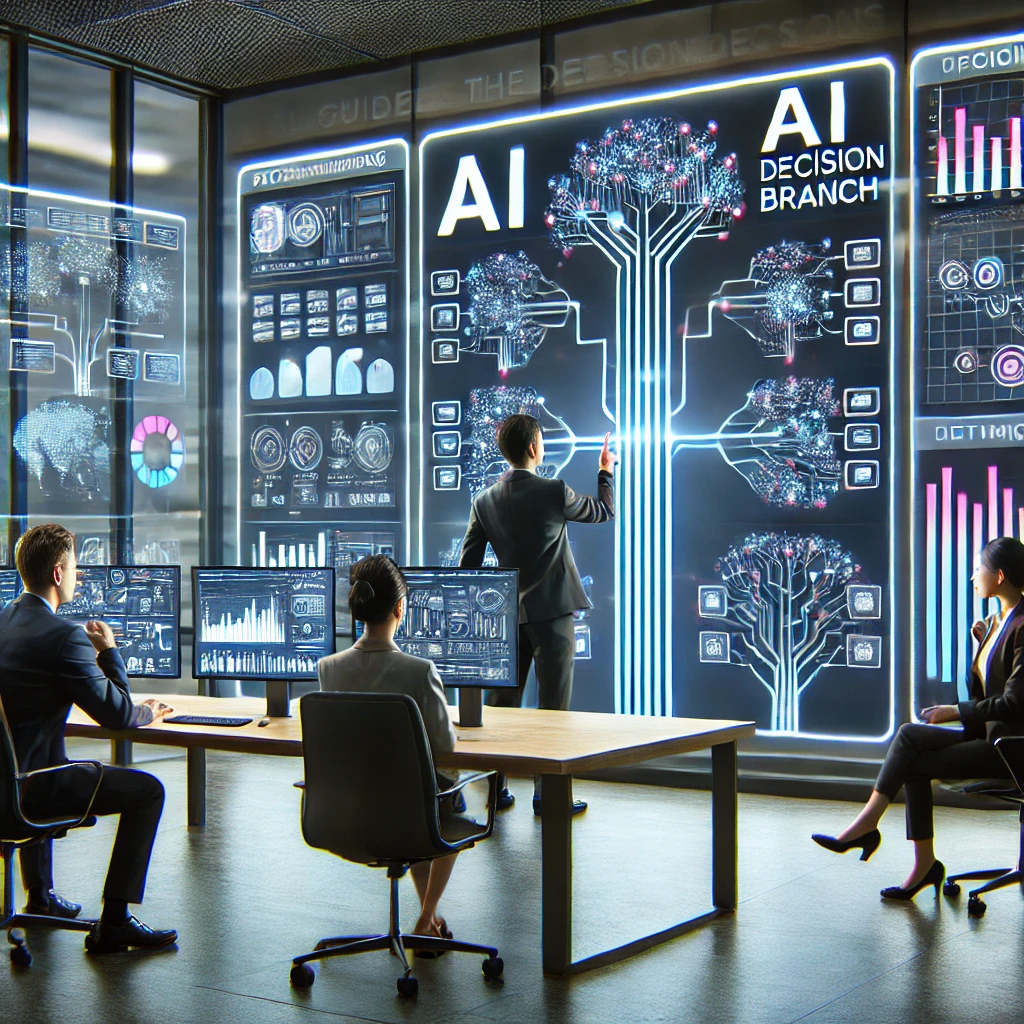Wie künstliche Intelligenz die Datenanalyse verändert
Die rasante Entwicklung der Künstlichen Intelligenz (KI) verändert die Art und Weise, wie Unternehmen Daten analysieren und Entscheidungen treffen, grundlegend. Durch den Einsatz von KI-gestützter Datenanalyse können riesige Mengen an Informationen in Rekordzeit verarbeitet werden, was zu verwertbaren Erkenntnissen führt. Ob es um die Vorhersage von Trends, die Optimierung von Abläufen oder die Minimierung von Risiken geht, KI-gestützte Entscheidungen sind der Schlüssel zu mehr Effizienz, Genauigkeit und Wettbewerbsfähigkeit in der heutigen schnelllebigen Geschäftswelt. In diesem Artikel wird untersucht, wie die KI-gestützte Datenanalyse funktioniert und welchen Wert sie branchenübergreifend bietet.
Was sind KI-gestützte Entscheidungen?
KI-gestützte Entscheidungen beruhen auf künstlicher Intelligenz, die Daten auswertet und fundierte Empfehlungen ausspricht. Die herkömmliche Datenanalyse umfasst oft manuelle Prozesse und zeitaufwändige Berechnungen. Im Gegensatz dazu automatisieren KI-Systeme die Analyse, erkennen Muster und liefern präzise Vorhersagen mithilfe von Technologien wie maschinellem Lernen, Big Data und Predictive Analytics.
Ein Einzelhändler kann zum Beispiel historische Verkaufsdaten mit KI analysieren, um die zukünftige Nachfrage zu prognostizieren. Auf diese Weise können sie ihren Bestand optimieren, Verschwendung reduzieren und die Kundenbedürfnisse besser erfüllen. KI-gestützte Systeme arbeiten in Echtzeit und ermöglichen schnellere Entscheidungen auf der Grundlage zuverlässiger, datengestützter Erkenntnisse.
Warum KI-gestützte Datenanalyse für Unternehmen wichtig ist
Moderne Unternehmen müssen ständig wachsende Datenmengen verarbeiten. KI-gestützte Analysen bieten einen erheblichen Vorteil, indem sie Arbeitsabläufe automatisieren, Fehler reduzieren und klare Empfehlungen geben. Dies ermöglicht es Führungskräften, fundierte Entscheidungen zu treffen, die den langfristigen Erfolg fördern.
Denken Sie an die Marketingoptimierung: KI kann Kundendaten analysieren und präzise Zielgruppen identifizieren. Anstatt sich auf allgemeine Kampagnen zu verlassen, können Unternehmen personalisierte Strategien umsetzen, die die Konversionsraten deutlich verbessern.
Die wichtigsten Vorteile von AI-gestützten Entscheidungen
1. Gesteigerte Effizienz durch Automatisierung
Die manuelle Datenanalyse ist zeitintensiv und fehleranfällig. KI automatisiert den Prozess und liefert schnellere und genauere Ergebnisse. Dies beinhaltet:
- Datenanalyse in Echtzeit: Die KI verarbeitet kontinuierlich neue Daten und liefert sofortige Erkenntnisse.
- Automatisierte Berichterstattung: Anstatt Stunden mit der Erstellung von Berichten zu verbringen, erstellt KI innerhalb von Minuten detaillierte visuelle Dashboards.
- Fehlervermeidung: KI minimiert das Risiko menschlicher Fehler und erhöht die Genauigkeit und Zuverlässigkeit.
Im Finanzwesen zum Beispiel überwachen KI-Systeme automatisch Transaktionsdaten, um Anomalien wie betrügerische Aktivitäten zu erkennen, was Zeit spart und die Sicherheit erhöht.
2. Verbesserte Prognosen mit Predictive Analytics
KI-Systeme analysieren historische Daten, um zukünftige Entwicklungen vorherzusagen. Dies ist besonders nützlich für:
- Bedarfsplanung: Unternehmen können die Nachfrage nach Produkten und Dienstleistungen genau vorhersagen.
- Risikomanagement: KI hilft dabei, potenzielle Risiken zu erkennen und proaktive Strategien zur Risikominderung zu entwickeln.
- Vorausschauende Wartung: In der Fertigung überwacht KI Maschinen, um Ausfälle vorherzusagen und kostspielige Ausfallzeiten zu reduzieren.
Ein Logistikunternehmen kann beispielsweise mithilfe von KI den idealen Wartungsplan für seinen Fuhrpark ermitteln, um Unterbrechungen zu minimieren und die Betriebskosten zu senken.
3. Datengestützte Entscheidungsfindung in Echtzeit
In schnelllebigen Märkten ist Geschwindigkeit entscheidend. KI-gestützte Analysen interpretieren Daten in Echtzeit und ermöglichen es Unternehmen, schnelle und fundierte Entscheidungen zu treffen. Tools wie Tableau und Microsoft Power BI bieten Dashboards in Echtzeit, mit denen Führungskräfte die Abläufe überwachen und sofort Maßnahmen ergreifen können.
Im E-Commerce zum Beispiel analysieren KI-Systeme das Nutzerverhalten in Echtzeit und geben personalisierte Produktempfehlungen. Das verbessert die Kundenzufriedenheit und steigert den Umsatz.
KI-gestützte Datenanalyse über Branchen hinweg
Gesundheitswesen
KI unterstützt Ärzte durch die Analyse medizinischer Daten, um Diagnosen und Behandlungspläne zu verbessern. Tools wie IBM Watson Health verarbeiten riesige Mengen an medizinischer Fachliteratur und Patientendaten und geben präzise Empfehlungen, die die Ergebnisse der Gesundheitsversorgung verbessern.
Finanzen
Finanzinstitute nutzen KI, um Betrug zu erkennen, Kreditrisiken zu bewerten und personalisierte Finanzprodukte anzubieten. Algorithmen des maschinellen Lernens analysieren Transaktionsmuster und erkennen ungewöhnliches Verhalten, um Kunden zu schützen und Betrug zu verhindern.
Einzelhandel
Einzelhandelsunternehmen nutzen KI, um die Bestandsverwaltung zu optimieren und maßgeschneiderte Kundenerlebnisse zu bieten. Plattformen wie Salesforce Einstein analysieren das Einkaufsverhalten und ermöglichen es Unternehmen, gezielte Marketingstrategien zu entwickeln, die das Engagement und den Umsatz steigern.

Herausforderungen und ethische Erwägungen
KI-gestützte Entscheidungen bieten zwar erhebliche Vorteile, aber Unternehmen müssen sich auch mit Herausforderungen wie Datenschutz und ethischen Überlegungen auseinandersetzen. Da KI-Systeme mit sensiblen Informationen umgehen, sind robuste Sicherheitsmaßnahmen wie Verschlüsselung und kontrollierter Zugang unerlässlich. Außerdem müssen Unternehmen KI-Modelle auf Voreingenommenheit überwachen, um faire und transparente Entscheidungsprozesse zu gewährleisten.
Die Zukunft der KI-gestützten Entscheidungen
Das Potenzial der KI-gestützten Datenanalyse beginnt sich gerade erst zu entfalten. Künftige Entwicklungen werden noch fortschrittlichere Fähigkeiten mit sich bringen, wie z. B.:
- Verbesserte Automatisierung: Mehr Prozesse werden vollständig von KI verwaltet, was die Produktivität erhöht.
- Erklärbare KI (XAI): KI-Entscheidungen werden transparenter, so dass es für die Nutzer einfacher wird, Empfehlungen zu verstehen und ihnen zu vertrauen.
- Optimierung in Echtzeit: KI-Systeme werden Abläufe sofort analysieren und optimieren und Unternehmen dabei helfen, agil und wettbewerbsfähig zu bleiben.
Im Energiesektor könnte KI beispielsweise Echtzeit-Netzdaten analysieren, um die Energieverteilung auszugleichen, Verschwendung zu reduzieren und die Effizienz zu verbessern.
Schlussfolgerung: KI-gestützte Entscheidungen als Wettbewerbsvorteil
KI-gestützte Entscheidungen ermöglichen es Unternehmen, komplexe Daten effizient zu verarbeiten und auf der Grundlage von Erkenntnissen zu handeln. Von der Automatisierung von Arbeitsabläufen bis hin zur Vorhersage zukünftiger Trends - künstliche Intelligenz bietet greifbare Vorteile, die den Erfolg fördern. Durch Investitionen in KI-gestützte Datenanalysen können Unternehmen ihre Abläufe rationalisieren, die Genauigkeit verbessern und intelligentere, schnellere Entscheidungen treffen.
Unternehmen, die heute KI-gestützte Entscheidungen treffen, positionieren sich für langfristiges Wachstum und Wettbewerbsfähigkeit in einer zunehmend datengesteuerten Welt. Die Zukunft gehört denjenigen, die KI nutzen, um Informationen in Aktionen umzuwandeln.







